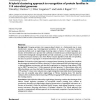Free Online Productivity Tools
i2Speak
i2Symbol
i2OCR
iTex2Img
iWeb2Print
iWeb2Shot
i2Type
iPdf2Split
iPdf2Merge
i2Bopomofo
i2Arabic
i2Style
i2Image
i2PDF
iLatex2Rtf
Sci2ools
BMCBI
2004
2004
A hybrid clustering approach to recognition of protein families in 114 microbial genomes
Background: Grouping proteins into sequence-based clusters is a fundamental step in many bioinformatic analyses (e.g., homology-based prediction of structure or function). Standard clustering methods such as single-linkage clustering capture a history of cluster topologies as a function of threshold, but in practice their usefulness is limited because unrelated sequences join clusters before biologically meaningful families are fully constituted, e.g. as the result of matches to so-called promiscuous domains. Use of the Markov Cluster algorithm avoids this non-specificity, but does not preserve topological or threshold information about protein families. Results: We describe a hybrid approach to sequence-based clustering of proteins that combines the advantages of standard and Markov clustering. We have implemented this hybrid approach over a relational database environment, and describe its application to clustering a large subset of PDB, and to 328577 proteins from 114 fully sequenc...
| Added | 16 Dec 2010 |
| Updated | 16 Dec 2010 |
| Type | Journal |
| Year | 2004 |
| Where | BMCBI |
| Authors | Timothy J. Harlow, J. Peter Gogarten, Mark A. Ragan |
Comments (0)

